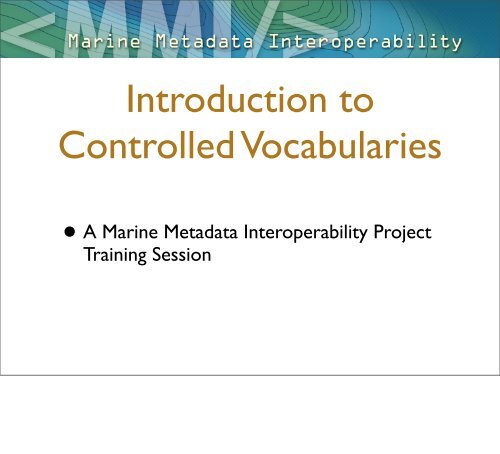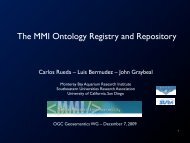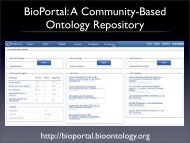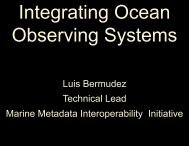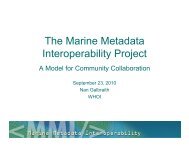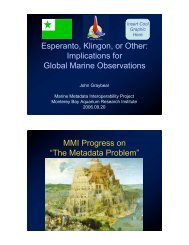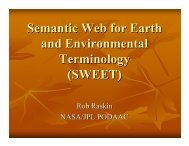Introduction to Controlled Vocabularies - Marine Metadata ...
Introduction to Controlled Vocabularies - Marine Metadata ...
Introduction to Controlled Vocabularies - Marine Metadata ...
You also want an ePaper? Increase the reach of your titles
YUMPU automatically turns print PDFs into web optimized ePapers that Google loves.
<strong>Introduction</strong> <strong>to</strong><br />
<strong>Controlled</strong> <strong>Vocabularies</strong><br />
• A <strong>Marine</strong> <strong>Metadata</strong> Interoperability Project<br />
Training Session
Overview<br />
• Semantic interoperability<br />
• Definition and types of controlled vocabularies<br />
• Benefits of implementing controlled vocabularies<br />
• <strong>Marine</strong> <strong>Metadata</strong> Interoperability (MMI) resources
Different representations<br />
for one concept<br />
SST, sea water temperature, water temperature, temp ...
A concept (like ‘SST’) could<br />
mean more than one thing<br />
SST Records.<br />
1978 formed<br />
Record Label<br />
Supersonic<br />
transport (SST)
Semantic Interoperability
Semantic Interoperability<br />
System A
Semantic Interoperability<br />
System B<br />
System A
Semantic Interoperability<br />
System B<br />
System A<br />
System C
Semantic Interoperability<br />
I Need SST data<br />
System B<br />
System A<br />
System C
Semantic Interoperability<br />
I have SST data<br />
I Need SST data<br />
System B<br />
System A<br />
System C
Semantic Interoperability<br />
I have SST data<br />
I Need SST data<br />
System B<br />
System A<br />
I have Water Temp data<br />
System C
Semantic Interoperability<br />
I have SST data<br />
I Need SST data<br />
System A<br />
Please give me SST data<br />
System B<br />
I have Water Temp data<br />
System C
Semantic Interoperability<br />
I have SST data<br />
I Need SST data<br />
System A<br />
Please give me SST data<br />
System B<br />
I have Water Temp data<br />
System C
Semantic Interoperability<br />
I have SST data<br />
I Need SST data<br />
System A<br />
Please give me SST data<br />
System B<br />
I have Water Temp data<br />
System C
Semantic Interoperability<br />
I have SST data<br />
I Need SST data<br />
System A<br />
Please give me SST data<br />
sure, here you go<br />
System B<br />
I have Water Temp data<br />
System C
Semantic Interoperability<br />
I have SST data<br />
I Need SST data<br />
System A<br />
Please give me SST data<br />
sure, here you go<br />
System B<br />
I have Water Temp data<br />
System C
Semantic Interoperability<br />
I have SST data<br />
I Need SST data<br />
System A<br />
Please give me SST data<br />
sure, here you go<br />
System B<br />
I have Water Temp data<br />
Please give me SST data<br />
System C
Semantic Interoperability<br />
I have SST data<br />
I Need SST data<br />
System A<br />
Please give me SST data<br />
sure, here you go<br />
System B<br />
I have Water Temp data<br />
Please give me SST data<br />
System C
Semantic Interoperability<br />
I have SST data<br />
I Need SST data<br />
System A<br />
Please give me SST data<br />
sure, here you go<br />
System B<br />
I have Water Temp data<br />
Please give me SST data<br />
sorry I don’t have any<br />
System C
Solution 1: Rename<br />
I have SST data<br />
I need SST data<br />
System B<br />
System A<br />
I have Water SSTTemp<br />
data<br />
System C
Solution 2: Mapping<br />
I need SST data<br />
which I know<br />
is a type of<br />
Water Temp data<br />
System B<br />
I have SST data<br />
System A<br />
I have Water Temp data<br />
System C
Both solutions needed<br />
I wonder what<br />
vocabularies systems A<br />
and C are using<br />
System B<br />
The<br />
vocabulary I use is<br />
from manual X<br />
System A<br />
The vocabulary I use is<br />
from convention Y<br />
System C
<strong>Controlled</strong> Vocabulary<br />
• a set of restricted terms<br />
• agreed by a community<br />
• used for:<br />
• describing resources<br />
• discovering resources<br />
• avoids:<br />
• inconsistencies<br />
• misspellings<br />
International Organization for Standardization (ISO). The official name is Codes for the representation of names of countries and their subdivisions.<br />
ISO 3166 was first published in 1974. It has been modified over the years, with subsequent editions published in 1981, 1988, and 1993. The most<br />
recent edition, its fifth, was published between 1997 and 1999.<br />
Country codes are a fundamental component of modern computing infrastructure: major operating systems, postal services, business applications,<br />
identification and security systems,<br />
email address etc.. etc..
Common characteristics<br />
Key Term Abbreviated<br />
Term<br />
Definition<br />
Modification<br />
Time
Types of <strong>Vocabularies</strong>
Library of Congress<br />
Code Lists
Alexandria Digital Library<br />
Thesaurus
On<strong>to</strong>logies<br />
Hierarchies<br />
Ad-hoc Relations<br />
MMI Platform On<strong>to</strong>logy<br />
Axioms
On<strong>to</strong>logies<br />
Hierarchies<br />
Ad-hoc Relations<br />
MMI Platform On<strong>to</strong>logy<br />
Axioms
On<strong>to</strong>logies<br />
Hierarchies<br />
Ad-hoc Relations<br />
MMI Platform On<strong>to</strong>logy<br />
Axioms
<strong>Controlled</strong> vocabularies<br />
are good for semantic<br />
interoperability. What<br />
are other benefits?
Putting your house<br />
in order<br />
Definitions force people <strong>to</strong><br />
reevaluate and homogenize<br />
their vocabularies.
Better user<br />
interfaces<br />
Computer programs<br />
can use the controlled<br />
vocabularies <strong>to</strong> provide<br />
better choices in pick<br />
lists (for example, with<br />
drop down and<br />
selection menus).
How MMI Can Help You<br />
http://marinemetadata.org
Find<br />
> 60 on<strong>to</strong>logies available at: http://marinemetadata.org/allont
http://marinemetadata.org/guideontpro
Workshops
“Advancing Domain <strong>Vocabularies</strong>”<br />
MMI workshop Aug 2005<br />
823 relations<br />
3,023 <strong>to</strong>tal mappings
Tools<br />
Stand alone:<br />
– VINE<br />
– Voc2OWL<br />
Web:<br />
– Voc2RDF<br />
– SEMOR<br />
23
References<br />
MMI is an international collaboration <strong>to</strong> promote the<br />
exchange, integration and use of marine data. Your<br />
input and participation is always welcome.<br />
For copies of this and related presentations visit<br />
http://marinemetadata.org/oceansciences08<br />
For references visit<br />
http://marinemetadata.org/trainingrefs<br />
24


